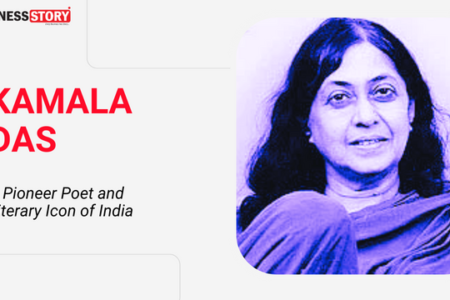Kamala Das, formerly known as Madhavikutty, stands as a distinguished Indian poet, author, and columnist whose influence resonates in both Indian and global literature. Her enduring legacy is defined by the fearless and bold expression of female sexuality, marking her as a distinctive voice in poetry. Let’s explore the captivating life and enduring impact of this remarkable literary figure.
Early Life and Childhood
Born on March 31, 1934, in Punnayurkulam, Kerala, India, Kamala Das was the daughter of V. M. Nair, a managing editor at the widely circulated Malayalam daily Mathrubhumi, and Nalapat Balamani Amma, a renowned Malayali poet. Growing up in a literary environment with familial ties to notable writers, Kamala’s early exposure to poetry ignited her passion for the art form.
Her childhood was a blend of urban and rural experiences, divided between Calcutta, where her father worked, and her ancestral home in Punnayurkulam. These diverse settings profoundly influenced her later writings.
Literary Career
Kamala Das’s literary journey unfolded fearlessly, exploring themes of love, sexuality, and societal norms. She emerged as a key figure in the Indian English poetry scene during the 1960s and 1970s. Her debut poetry collection, “Summer in Calcutta,” introduced a refreshing perspective to Indian English poetry, delving into love, betrayal, and emotional turmoil. The explicit nature of “The Descendants” encouraged women to embrace their femininity and desires without reservation.
In 1976, Kamala Das published the daring autobiography “My Story” (originally “Ente Katha” in Malayalam), providing an honest yet controversial account of her life. Her poems, known for their bold and frank expression, touched on freedom, love, and societal taboos. “Dance of Eunuchs” highlighted the inner struggles of eunuchs, shedding light on their plight.
Her literary legacy extends beyond poetry to include acclaimed short stories and novels, such as “Neermathalam Pootha Kalam,” “Alphabet of Lust,” and “Padmavati the Harlot.”
Personal Life
Married at 15 to Madhav Das, Kamala Das continued to pursue her literary passions amid marital responsibilities. In 1999, she embraced Islam at the age of 65, adopting the name Kamala Surayya. This decision sparked controversy, but Kamala Surayya remained steadfast in her choices.
Kamala Das passed away on May 31, 2009, at the age of 75, succumbing to pneumonia. She was laid to rest with full state honours at the Palayam Juma Masjid in Thiruvananthapuram, Kerala.
Legacy
Kamala Das’s legacy rests on her profound contributions to Indian English poetry and her fearless championing of female sexuality and empowerment. Her poetry and writings continue to inspire readers and writers globally. In 2018, Google paid tribute to her with a Doodle, recognising her significant impact on literature.
Translated into numerous languages, Kamala Das’s works have granted her a place as a global literary icon. Her unapologetic voice challenged societal norms, making her a trailblazer in an era when such frankness was often discouraged. Her legacy as a pioneering poet and author remains vibrant.
Awards and Recognitions
Throughout her career, Kamala Das received accolades such as the PEN Asian Poetry Prize, the Kerala Sahitya Akademi Award for Story for “Thanuppu,” and the Kendra Sahitya Academy Award for English poetry. She was shortlisted for the Nobel Prize in Literature in 1984.
Kamala Das’s impact on the literary world and her unwavering commitment to free expression continue to be celebrated, solidifying her status as one of the most influential poets in modern Indian literature.

